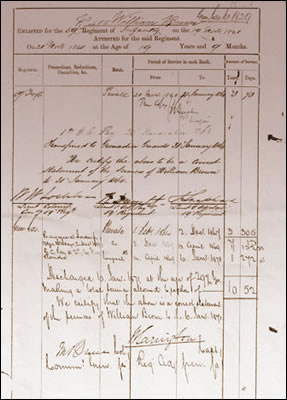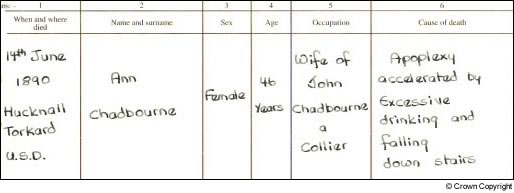Back in September 2009 I started a thread on Family Tree Forum’s General Board asking members what was their most disturbing genealogical find. Members replied with some rather shocking stories, some of which are published in this issue of the magazine. The reason why I asked was because I discovered one of my very own…
My great great grandmother, Ann Larkin(s), was born in Ireland in c1844, and was the daughter of Matthew Larkins, a labourer. She married a William Brown at St. Stephens Church, Paddington, London, on 31st October 1865. Rather strangely, I also found a marriage for them on 20th September 1869 at the Royal Chapel of the Tower of London. Their daughter, Adaline, had been born the previous year, but why the two separate marriages? I knew that William was a Grenadier Guard, based at Windsor Barracks at the time of Adaline’s birth, so perhaps the army didn’t recognise the first marriage for some reason?
 |
Anyway, William was pensioned out of the Grenadier Guards due to being unfit, and returned to Kirkby in Ashfield, Nottinghamshire, with Ann and their two children, where he took up his previous job as a framework knitter, which is shown as his occupation on the 1871 census. Sadly he died the following year.
Ann then married John G Chadbourne, a collier from Sutton in Ashfield, Nottinghamshire, on 20th February 1876 at St. Wilfreds Church, Kirkby in Ashfield. They moved to nearby Hucknall Torkard and had three children. Even though I found the family living there at the time of the 1881 census, the return 10 years later recorded that John was a widower. So what had happened to Ann?
Looking on the FreeBMD website I found a death registration entry for her in June quarter 1890. So I ordered the certificate online from the General Record Office and waiting impatiently for its arrival. Needless to say, when it did arrive I was rather shocked to discover that the cause of death was ‘apoplexy and excessive drinking and falling down the stairs’.
Like any genealogist I wasn’t prepared to leave the story there. What exactly were the circumstances surrounding my great great grandmother’s death? My curiosity was soon satisfied when I was able to find a report of the inquest in the Star and Advertiser newspaper, in my local library, entitled, “Another victim through drink at Hucknall Torkard”.
The inquest had taken place at the Crown public house in Byron Street, Hucknall Torkard, and the widower of the deceased, John Chadbourne, was called as the first witness. He stated that about 9.30 on the morning of Ann’s death he had gone to Nottingham and had left her at home in Buildings Street “all right and quite sober”. When he returned at about 5.30 p.m., after having drunk “about four pints of beer but no liquors”, he found her lying on the sofa snoring with her back towards him, so he threw a shawl over her and did not try to wake her. In doing so he noticed nothing unusual in her appearance, although she had not prepared any tea for him. After getting himself something to eat, he left for the Crown where he had three glasses of ale, until 9 p.m. when he was told that his wife was dead.
Evidently Ann was in the habit of drinking, just like her husband, although had shown no previous signs of ill health. Another witness, neighbour Emma Newton, described how she had gone to the house around lunchtime when Ann had asked her to clean the floor for her, claiming to be unwell, although she had already been drinking beer by that time. Afterwards, Ann asked Emma to fetch her a pint of beer, which they drank between them. Ann then tried to climb the stairs, although she could “scarcely walk”. When Emma told her to be careful and not fall she replied, “oh you go to hell!”. However she did indeed fall and Emma ran outside to fetch another neighbour, Mrs Dale.
Meanwhile, a bricklayer, ‘Mr. Vickers’, who was working in the yard heard a noise from inside the house and went in to investigate, where he found Ann lying on the floor. He picked her up, and placed her on the sofa. When Emma returned with Mrs Dale they thought that she wasn’t hurt so didn’t send for a doctor. Emma left Ann sleeping at around 4 p.m. and returned around 6 p.m. to find John at home, when she told him that Ann had fallen down the stairs.
The coroner asked Emma to confirm that she did indeed tell John that his wife had fallen down the stairs, to which she replied “Yes”. He also asked what state he was in when she found him at home, to which she responded, “Oh he was drunk”.
The coroner went on to question where the children were and who was there to provide them with their tea, questioning the morality of the situation. He said, “What is to become of the children of such parents? Both drunk, nobody to care for them, left entirely to chance; it is a very disgraceful state of things”.
 |
Yet John continued to maintain that no-one had told him that anything untoward had happened to his wife until he was summoned from the pub at 9pm. Ann’s 21 year old daughter, Adeline, had found her lying dead on the sofa a short time before and had sent for the doctor. John stated that, “When I got home I found my wife lying on the sofa dead. There was a crowd of people round the door and my wife’s daughter was in the house and some neighbours. I at once sent for Dr. Coates and he came immediately”.
Dr. Coates stated that Ann Chadbourne was “quite dead” when he arrived. He had been informed that she had fallen down the stairs, and had every appearance of having died of apoplexy, accelerated by the fall. He also said that John Chadbourne was “so drunk that he could not walk straight”.
The coroner, in summing up, said, “The facts of the case are now before you and it is for you to decide what shall be the verdict. If this case is typical of the sort of life led by working men in this locality it is very sad indeed, and ought to be lamented by every thoughtful person.” The medical evidence showed that Ann’s death was due to apoplexy, although several of the jury felt that it shielded the real cause of death, which was quite clearly the result of a fall while in a state of intoxication. Both the coroner and the doctor agreed that drink had a great deal to do with her death, and it was, therefore, ultimately decided that Ann Chadbourne died from ‘apoplexy, accelerated by falling down the stairs while in a state of intoxication’.
The coroner also spoke about the holding of inquests in public houses particularly in the the light of this case:- “He deprecated the system of bringing a number of people together in such places, as very often the nature of the proceedings were of such a character as to render it very inconvenient for them to hold meetings in such houses, and he would ask Mr. Wagg (the foreman) who was a member of the local board to bring the subject before the board and ask that the police might have power to arrange for all such inquiries to be held in the local board room. Mr. Wagg promised to do so”.
Darksecretz
© Darksecretz 2020
SOURCES
Hucknall Library, Nottinghamshire for the Star and Advertiser newspaper